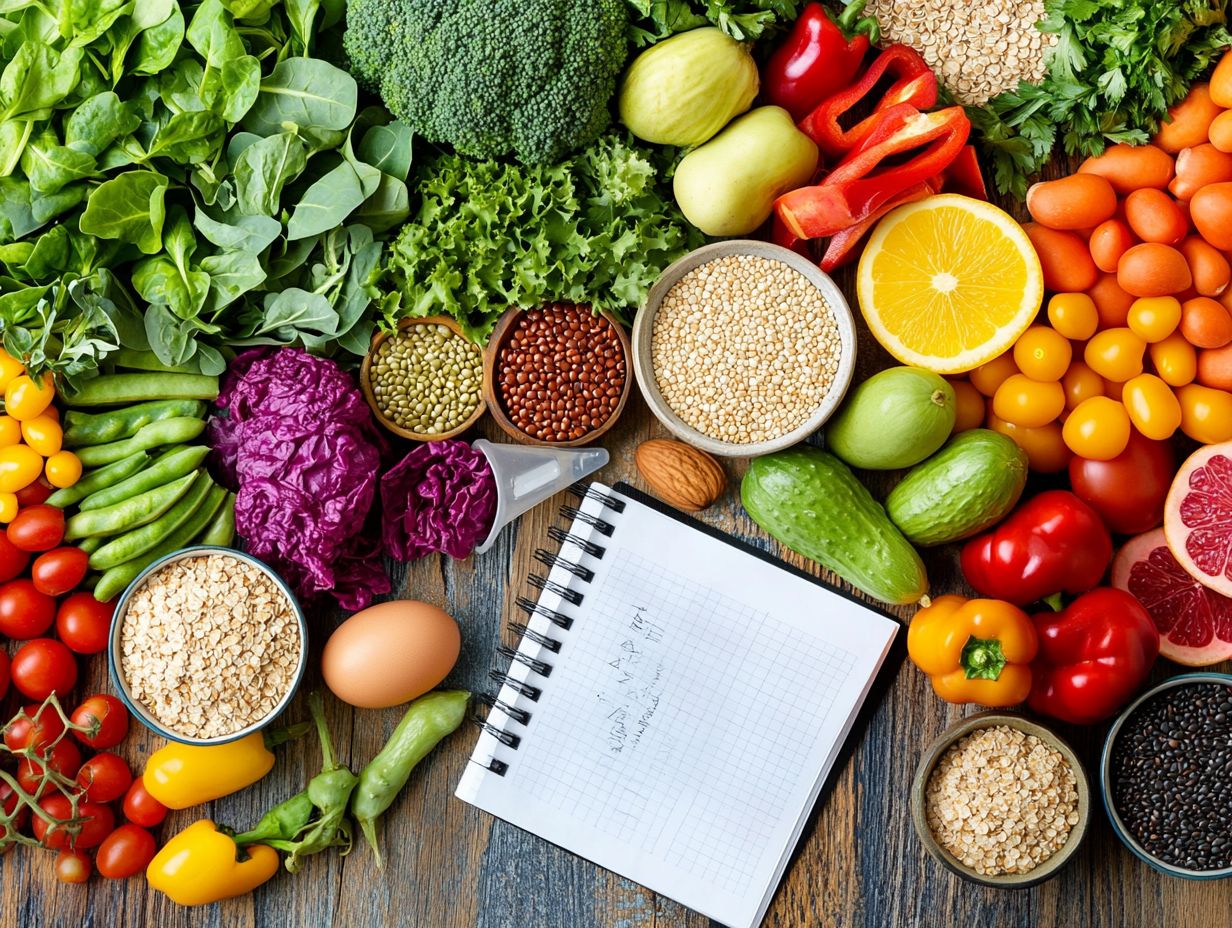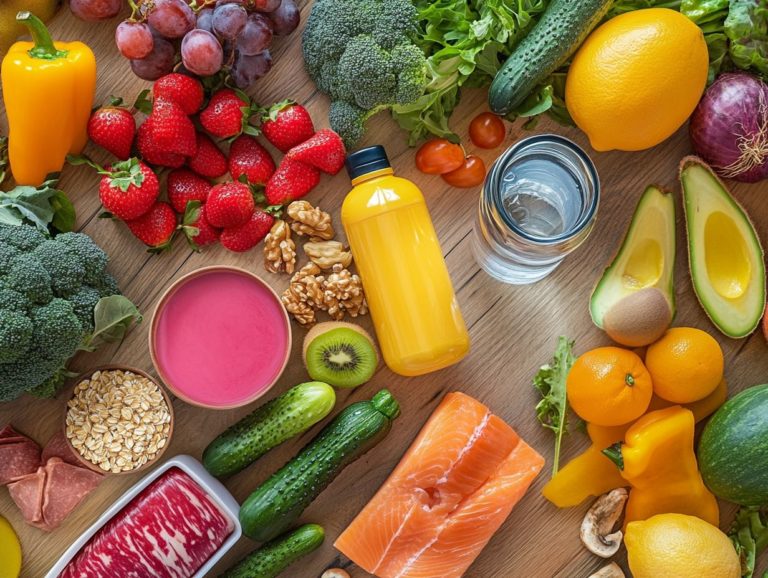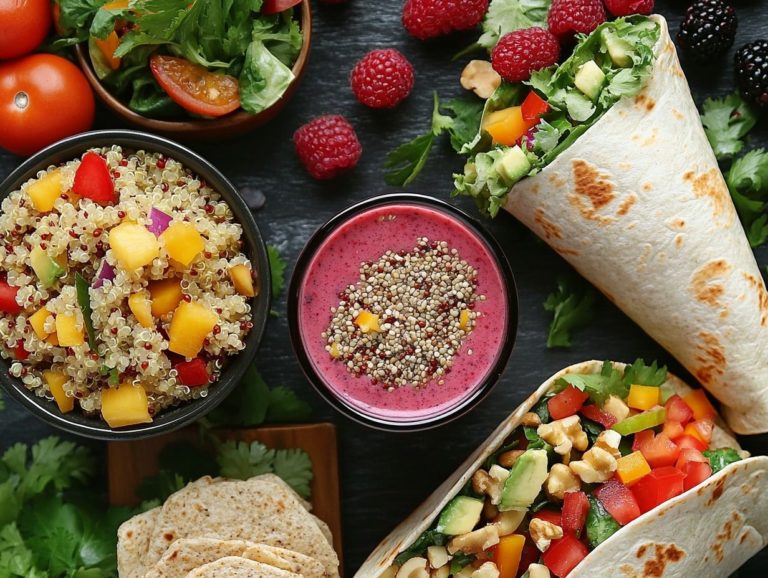Nutrition for Plant-Based Dieters: Essential Tips
Curious about the benefits of a plant-based diet but not quite sure how to fulfill your nutritional needs? This guide is designed to help you navigate the realm of plant-based eating, emphasizing the significance of proper nutrition and the key nutrients you should focus on.
It addresses potential deficiencies, provides practical tips for meal planning, and debunks the common myths that often surround plant-based diets.
Whether you re a seasoned vegan or just dipping your toes into this lifestyle, you ll discover valuable insights to ensure a balanced and nourishing approach to your meals.
Contents
- Key Takeaways:
- Why Nutrition is Important for Plant-Based Dieters
- Tips for Meeting Nutritional Needs on a Plant-Based Diet
- Meal Planning for Plant-Based Dieters
- Common Misconceptions About Plant-Based Diets
- Frequently Asked Questions
- What is a plant-based diet?
- What are the benefits of a plant-based diet?
- How can I ensure I am getting enough protein on a plant-based diet?
- What are some key nutrients to pay attention to on a plant-based diet?
- Is it difficult to maintain a plant-based diet while dining out?
- Can I still enjoy my favorite foods on a plant-based diet?
Key Takeaways:

- A plant-based diet consists of mostly or entirely plant-based foods, including fruits, vegetables, grains, and legumes.
- Proper nutrition is vital for anyone on a plant-based diet to ensure they are getting key nutrients and to prevent potential deficiencies.
- To meet their nutritional needs, plant-based dieters should focus on incorporating a variety of foods and consider supplementation options.
What is a Plant-Based Diet?
A plant-based diet centers on enjoying foods derived from plants, including a vibrant array of fruits, vegetables, whole grains, legumes, nuts, and seeds, while minimizing, if not completely eliminating, animal products. This approach is celebrated for its rich diversity in flavors and nutritional benefits, making it an appealing choice for anyone looking to enhance their health, lower cholesterol, and reduce the risk of chronic diseases like heart disease and type two diabetes.
A plant-based diet offers numerous health benefits. It also considers environmental and ethical issues related to animal welfare.
Various types of plant-based diets exist. For example, vegans avoid all animal products, while vegetarians consume dairy and eggs. Flexitarians focus on plants but occasionally eat meat.
By incorporating these nutritional powerhouses into your daily meals, you can experience the amazing benefits of improved digestion, increased energy, and a powerful boost of vitamins, minerals, and antioxidants essential elements that promote overall health and enhance your well-being.
Why Nutrition is Important for Plant-Based Dieters
Nutrition serves as the cornerstone of a successful plant-based diet, and you can find valuable insights in Nutrition for Plant-Based Families: Tips and Tricks, ensuring that you get essential vitamins, minerals, and nutrients for optimal health.
By embracing a diverse array of plant-based foods, you can unlock significant health advantages, including a lowered risk of chronic conditions such as obesity, heart disease, and type two diabetes.
Familiarizing yourself with dietary guidelines enables you to craft balanced meals that not only support your health but also elevate your overall well-being.
Key Nutrients to Focus on
For those embracing a plant-based diet, concentrating on vital nutrients like protein, fiber, calcium, and various vitamins is essential for optimizing health and preventing deficiencies. By incorporating a diverse array of plant-based foods, such as legumes, whole grains, nuts, and seeds, you can meet your nutritional needs while reaping the benefits of essential antioxidants. For more detailed guidance, check out nutrition for vegan athletes that safeguard against cellular damage.
It s crucial to know which foods are rich in these nutrients for effective meal planning and preparation.
To achieve a balanced intake, consider adding quinoa and lentils to your meals as outstanding sources of protein, while leafy greens like kale and broccoli deliver a generous dose of calcium. Fruits such as bananas and avocados are excellent sources of potassium, which is vital for muscle and nerve function, and fortified plant milks can enhance your vitamin D intake.
Regarding meal preparation, think about:
- Batch cooking grains and legumes
- Crafting nutrient-dense salads
- Utilizing a variety of spices to elevate flavors
By planning your meals in advance, you open the door to experimenting with different recipes and ensuring that each meal is brimming with essential vitamins and minerals, ultimately supporting your overall health and well-being.
Don t wait! Dive into the vibrant world of plant-based eating and start reaping the benefits today!
Potential Deficiencies

Despite the numerous benefits of a plant-based diet, you may encounter potential deficiencies in essential nutrients like vitamin B12, iron, and omega-3 fatty acids, which are mostly found in animal products. Being aware of these potential gaps is crucial for preventing health complications that could arise from insufficient intake.
To tackle these nutritional shortfalls, considering dietary supplements or fortified foods might be a wise move to ensure you meet your overall health needs. Besides supplements, it s important to diversify your food choices.
You might want to explore fortified breakfast cereals and plant-based milk to boost your vitamin B12 intake, along with incorporating legumes, seeds, and leafy greens to elevate your iron levels. To enhance your omega-3 fatty acids, including flaxseeds, chia seeds, and walnuts in your diet can work wonders.
Understanding these nutritional tips is your key to thriving on a plant-based lifestyle and fully enjoying its many advantages while safeguarding your health.
Tips for Meeting Nutritional Needs on a Plant-Based Diet
Meeting your nutritional needs on a plant-based diet demands careful meal preparation and a commitment to incorporating a diverse array of whole foods. By honing your cooking skills and diving into a variety of recipes, you can craft meals that are not only delicious but also nutritionally rich, supporting your overall health and well-being.
This approach elevates your cooking experience and deepens your connection with the vibrant world of plant-based foods.
Incorporating a Variety of Foods
Incorporating a delightful array of plant-based foods think fruits, vegetables, whole grains, and legumes is crucial for crafting a well-rounded diet that fulfills your nutritional needs. This diversity not only enhances the flavor and texture of your meals but also guarantees a comprehensive intake of vitamins, minerals, and antioxidants essential for your overall health.
Emphasizing variety supports weight management and reduces the risk of chronic diseases by introducing a spectrum of nutrients into your diet.
For instance, kickstart your day with a vibrant smoothie made from berries, spinach, and a banana for an instant nutrient boost. At midday, indulge in a hearty quinoa salad brimming with roasted vegetables and chickpeas, providing a satisfying dose of protein and fiber. When dinner rolls around, whip up a stir-fry featuring mixed bell peppers, broccoli, and tofu; it not only cooks beautifully but also serves up an impressive array of essential nutrients.
By mixing and matching various ingredients, you can keep your meals exciting, effectively warding off the dietary monotony that often leads to cravings and less favorable choices.
Supplementation Options
For those embracing a plant-based diet, supplementation can serve as a valuable strategy to bridge nutritional gaps, particularly for nutrients like vitamin B12 and omega-3 fatty acids that aren t as plentiful in plant sources. By grasping the benefits of various supplements, you can effectively maintain your health while staying true to your dietary preferences.
Selecting high-quality supplements tailored to your specific nutritional needs is essential for achieving optimal well-being. Integrating supplements into your plant-based routine may also enhance overall nutrient absorption, support your energy levels, and promote mental clarity.
Whether you’re considering a reliable source of plant-based protein powder, looking into probiotics for gut health, or adding iron supplements to meet your daily requirements, making informed choices is vital. It’s always a good idea to consult a healthcare professional or nutritionist to pinpoint the right combination of supplements.
This will ensure they complement your dietary choices effectively and support your individual health goals. Consider starting your supplement journey today!
Meal Planning for Plant-Based Dieters

Effective meal planning is essential for you as a plant-based dieter. It ensures that you meet your nutritional needs while keeping your grocery bills in check.
By preparing your meals in advance and exploring various recipes, you can incorporate a wide array of plant-based foods. This will enhance your cooking skills and elevate your enjoyment of meals.
This thoughtful strategy promotes healthy eating habits, reduces food waste, and optimizes your budget management.
Creating Balanced and Nutritious Meals
Creating balanced and nutritious meals is essential for you as a plant-based dieter. Exploring the top superfoods for a plant-based diet can help you meet your dietary needs while savoring each bite.
By combining a variety of food groups think whole grains, legumes, fruits, and vegetables you can ensure your meals are filled with important nutrients and delightful flavors. Embracing vibrant recipes and cooking techniques transforms meal preparation into both a joyous and healthful experience.
Incorporating a spectrum of colors and textures elevates the visual appeal of your plates and enhances the taste. You can explore a diverse culinary landscape with ease.
Consider a hearty quinoa salad brimming with roasted chickpeas, bell peppers, and a zesty lemon-tahini dressing as a standout main course. Or indulge in a creamy lentil soup infused with garlic and herbs, providing a comforting option packed with protein.
These examples illustrate that plant-based eating can be a feast for the senses. You don t have to sacrifice taste while addressing nutritional needs and championing a sustainable lifestyle.
Common Misconceptions About Plant-Based Diets
Despite the growing trend of plant-based diets, several misconceptions cloud perceptions about their health benefits and practicality. You might encounter the notion that plant-based eating is just a realm of processed foods or that it falls short in meeting nutritional requirements.
This skepticism can deter potential dieters from exploring the advantages of such a lifestyle. It is crucial to address these misunderstandings to foster a clearer and more informed perspective on the many benefits and the practicality of embracing a plant-based approach.
Addressing Myths and Misinformation
Addressing the myths and misinformation surrounding plant-based diets is vital for cultivating an accurate understanding of their health benefits and practicality. Many people mistakenly assume that plant-based diets don t provide enough protein or essential nutrients. This misunderstanding can hold them back from exploring this dietary option.
One prevalent misconception is the belief that only animal sources offer complete proteins. In reality, numerous plant-based foods are rich in high-quality protein, such as quinoa, lentils, and chickpeas.
Research has shown that a well-planned plant-based diet can satisfy all nutritional needs, including essential amino acids, vitamins, and minerals.
A diverse array of fruits, vegetables, nuts, and whole grains can collectively meet protein requirements while also providing additional health benefits like fiber and antioxidants. By highlighting these facts, you can help dispel fears and misconceptions, enabling individuals to embrace a healthier, plant-centric lifestyle.
Frequently Asked Questions

What is a plant-based diet?
A plant-based diet focuses on consuming mostly or entirely foods that come from plants, such as fruits, vegetables, whole grains, legumes, nuts, and seeds. It excludes or limits animal products and by-products like meat, dairy, eggs, and honey.
What are the benefits of a plant-based diet?
A plant-based diet offers many health benefits. It reduces the risk of chronic diseases such as heart disease and diabetes.
This diet can also aid weight loss, improve digestion, and boost energy levels.
How can I ensure I am getting enough protein on a plant-based diet?
Many believe it is hard to get enough protein from plants. However, beans, lentils, tofu, nuts, and seeds are excellent protein sources.
Consider adding plant-based protein powders and bars as well.
What are some key nutrients to pay attention to on a plant-based diet?
A plant-based diet can supply essential nutrients, so it’s important to focus on getting enough iron, calcium, vitamin B12, and omega-3 fatty acids. For more detailed information, check out this resource on nutrition for plant-based diets.
You can find these nutrients in dark leafy greens, fortified plant milks, and flaxseeds.
Is it difficult to maintain a plant-based diet while dining out?
You can maintain a plant-based diet even when dining out. Many restaurants offer vegan options or will modify dishes for you.
Can I still enjoy my favorite foods on a plant-based diet?
You can still enjoy your favorite foods on a plant-based diet. With many plant-based alternatives, you can have burgers, pizza, and even ice cream!
It s all about discovering creative and tasty substitutions.






